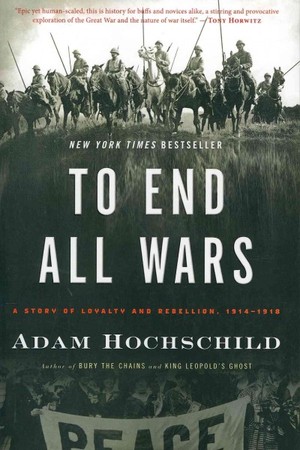 |
To End All WarsBy Tom Blakemore (reviewer)To End All Wars: A Story of Loyalty and Rebellion, 1914-1918. If any question why we died, Tell them, because our fathers lied. Rudyard Kipling, "Epitaphs of the War"
Nearly a century ago the greatest event of the twentieth century blossomed across the fields of Europe, an event whose legacy is with us still. Woodrow Wilson famously called the 1914-1918 war, "The war to end all wars." Alfred, Lord Milner called the aftermath, "The Peace to end all Peace." In this book, author Adam Hochschild explores why the events of First World War are so meaningful in the twenty-first century and how this great conflict shaped the modern world. He brings a new perspective, focusing on those who resisted the militarism on all sides and followed their conscience and principles to try to end the madness. Over the course of these four and a half years, the carnage is almost beyond understanding. In all, there were approximately 10 million military dead and 21 million more wounded. Great Britain lost 722,000 dead, there were more than double that number in France and more than triple in Germany. The civilian cost was an estimated 12 to 13 million deaths. Yet in the years and months leading up to the beginning of hostilities there were many in all countries that foresaw the carnage to come and were actively working to avoid this war. As Hochschild writes, "What kings and prime ministers did not foresee, many more far-sighted citizens did. From the beginning, tens of thousands of people on both sides recognized the war for the catastrophe it was. They believed it was not worth the inevitable cost in blood; some of them anticipated with tragic clarity at least part of the nightmare that would engulf Europe as a result, and they spoke out." These resistors came from the ranks of the socialists, those fighting for social justice, suffragettes and intellectuals. And the price was indeed high: from estrangement from one's family to being stoned at peace demonstrations to harassment from the police and government spies to serving prison time, these people had the courage and fortitude to stand for their beliefs in front of all that was thrown at them. "This is a story of loyalties. What should any human being be most loyal to? Country? Military duty? Or the ideal of international brotherhood?" In Britain, by the conflict's end, more than 20,000 British men of military age had refused the draft. More than "6,000 served prison terms under harsh conditions: hard labor, a bare bones diet and a strict rule-of-silence." Of those who served time for their resistance were Britain's leading investigative journalist, a future winner of the Nobel Prize, more than a half dozen future members of Parliament, and a future cabinet minister. The ranks of the pacifists going to prison included many women such as Charlotte Despard, one of the main speakers and writers against the war. Although a leader in the anti-war movement, she never lost her affection for her younger brother, "dearer to me than anyone else," General Sir John French. French was the commander-in-chief of all British forces on the Western front and whose troops suffered hundreds of thousands of deaths in futile frontal assaults on the German trenches, barbed wire, and machine guns. The fruits of this war are with us still today: the use of poison gas led to the widespread use of defoliants in Vietnam and resulting tragic birth defects; German bombing of English and French cities and civilians would lead to Hiroshima and Nagasaki; and the industrialization of war has led to the weapons of mass destruction around the world. As Lord Landsdowne correctly predicted at the outset of the war, "The prostitution of science for the purposes of destruction" was upon us. For all those who are interested in peace activism and social justice, this book is a milestone in reporting. Hochschild takes on the crucial issues of pacifism and the question of loyalties as a citizen of both country and the world in an engaging and lively history of the era. Focusing primarily on Great Britain (where resistance was greatest to the war) he weaves a story of the cost of speaking out on the personal lives of the participants. As important as these issues were to people in 1914-1918, they are equally important to us today as government propaganda (which came of age during the Great War) time and again leads us into unnecessary war and suffering. For as historian Howard Zinn (The People's History of the United States) has said, "If you don't know history, it's like you were born yesterday; anyone up there in a position of power can tell you anything and you have no way of checking up on it." Those from 1918 who survived vowed Never Again, and still today, we have failed to heed their hard-won advice. To go against the mainstream and listen to one's conscience at such a time can be a lonely struggle. As mathematician, philosopher and Nobel Prize winner Bertrand Russell wrote and is quoted in the final paragraph of this fine work, "I knew it was my duty to protest, however futile that protest might be. I felt that for the honor of human nature those who were not swept off their feet should show that they stood firm." Even a century's worth of bloodshed after the war that was supposed to end all wars, we are painfully far from the day when most people on earth will have the wisdom to feel, as did Alice Wheeldon in her prison cell, "The world is my country." Tom Blakemore (US Army 1969-1971) is a professional sound editor and mixer for film and television. He currently teaches film sound at Tribeca Flashpoint Media Arts Academy in Chicago.
|


